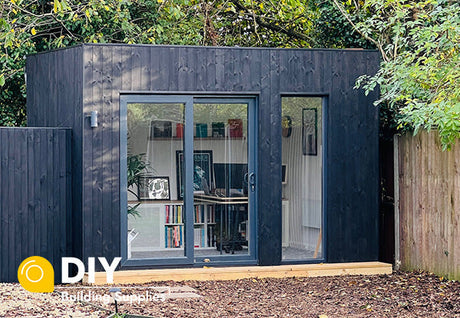In today's construction landscape, choosing eco-friendly building supplies has evolved from a niche interest to a mainstream necessity. With building regulations increasingly focused on environmental performance and energy efficiency, the question isn't whether to embrace sustainable materials—it's determining which eco-friendly options deliver genuine value for your investment.
At DIY Building Supplies, we've guided countless projects through the complexities of sustainable material selection. Our experience shows that whilst the green building market offers numerous options, not all eco-friendly products provide equal returns on investment. Understanding which materials offer genuine benefits helps ensure your project achieves both environmental goals and practical performance requirements.
Understanding True Environmental Value
The eco-friendly building supplies market can seem overwhelming, with countless products claiming environmental credentials. However, genuine sustainability extends beyond marketing claims to encompass the entire lifecycle of materials—from manufacturing and transport through to end-of-life disposal or recycling potential.
Materials with robust environmental credentials typically demonstrate measurable benefits across multiple categories. Low embodied energy during manufacture, minimal environmental impact during production, excellent durability extending service life, and potential for recycling or reuse at project completion all contribute to genuine sustainability credentials.
British manufacturers like Knauf and Celotex have invested heavily in developing products that meet these comprehensive sustainability criteria. Their manufacturing processes increasingly incorporate recycled content whilst maintaining the performance characteristics demanded by modern construction standards.
Insulation: Where Eco-Friendly Delivers Exceptional Value
Insulation represents perhaps the most compelling case for eco-friendly building supplies, delivering both immediate environmental benefits and long-term financial returns. The thermal performance improvements achieved through quality insulation create energy savings that continue throughout the building's lifetime, making even premium eco-friendly options excellent investments.
Natural fibre insulations, including sheep's wool and recycled cotton variants, offer impressive performance characteristics alongside their environmental credentials. These materials typically achieve thermal conductivity values between 0.035-0.040 W/mK—comparable to synthetic alternatives whilst providing superior moisture management properties. Their ability to absorb and release moisture helps regulate humidity levels naturally, contributing to healthier indoor environments.
Modern mineral wool insulation from manufacturers like Knauf demonstrates how traditional materials can embrace sustainability without compromising performance. These products increasingly incorporate recycled content—often exceeding 80% recycled glass or stone—whilst maintaining excellent thermal performance and fire resistance ratings. The manufacturing processes have evolved to minimise energy consumption whilst producing materials that significantly reduce building energy demands throughout their service life.
For projects requiring exceptional thermal performance, PIR insulation boards offer outstanding value despite their premium pricing. Products from Celotex and Kingspan achieve thermal conductivity values as low as 0.022 W/mK, allowing thinner insulation layers to achieve demanding U-value targets. Whilst the initial cost exceeds basic alternatives, the space savings and enhanced performance often justify the investment, particularly in renovation projects where cavity dimensions are constrained.
Timber: Sustainable When Sourced Responsibly
Responsibly sourced timber remains one of construction's most sustainable materials, provided procurement follows established certification schemes. FSC (Forest Stewardship Council) and PEFC (Programme for the Endorsement of Forest Certification) standards ensure timber originates from well-managed forests that maintain biodiversity whilst providing economic benefits to local communities.
British-grown timber offers particular advantages, combining sustainability credentials with reduced transport impacts. Native species like Douglas fir and larch provide excellent structural properties whilst supporting domestic forestry industries. These materials typically demonstrate lower embodied energy than imported alternatives whilst offering comparable performance characteristics.
For structural applications, engineered timber products deserve serious consideration. Glulam beams and CLT (Cross Laminated Timber) panels maximise the structural potential of timber resources whilst creating opportunities for off-site fabrication that reduces on-site waste. These products often achieve superior performance compared to traditional solid timber whilst making efficient use of smaller timber sections that might otherwise have limited structural applications.
Roofing Materials: Balancing Performance and Sustainability
The roofing materials sector demonstrates significant variation in environmental credentials, with some options delivering clear sustainability advantages whilst others offer marginal benefits despite premium pricing.
Clay tiles from British manufacturers represent excellent long-term value, combining exceptional durability with relatively low environmental impact during production. Modern manufacturing processes have reduced energy consumption whilst maintaining the performance characteristics that enable service lives exceeding 60 years. The potential for reclamation and reuse at end-of-life adds further sustainability value, creating materials that can serve multiple building lifecycles.
Natural slate continues to offer unmatched longevity, with many Welsh slate roofs performing admirably after more than a century of service. Whilst quarrying operations involve environmental impacts, the extraordinary service life of quality slate creates compelling sustainability arguments. The minimal maintenance requirements and potential for salvage and reuse strengthen the environmental case for this premium material.
Metal roofing systems increasingly demonstrate impressive sustainability credentials through high recycled content and excellent recyclability at end-of-life. Modern steel and aluminium systems often incorporate 25-30% recycled content whilst offering complete recyclability when eventually replaced. The lightweight nature of these systems also reduces structural loading requirements, potentially allowing lighter structural solutions throughout the building.
Building Aggregates: Local Sourcing Makes the Difference
For building aggregates, sustainability often correlates directly with transportation distances. Local sourcing dramatically reduces the environmental impact of these essential materials whilst supporting regional quarrying operations that understand local building traditions and requirements.
Recycled aggregates offer genuine environmental benefits for appropriate applications. Crushed concrete and brick provide excellent material for drainage layers, hardcore, and non-structural applications whilst diverting waste from landfill sites. These materials typically cost less than virgin aggregates whilst delivering comparable performance for many construction applications.
However, recycled aggregates require careful specification to ensure suitability for intended applications. Our technical team can provide guidance on appropriate uses and help identify where recycled materials offer genuine advantages over traditional alternatives.
What's Actually Worth the Premium?
Our experience suggests certain eco-friendly building supplies consistently deliver value that justifies their premium pricing. High-performance insulation materials create energy savings that continue throughout the building's life, making even expensive options worthwhile investments. Responsibly sourced timber provides excellent environmental credentials without significant cost penalties compared to standard alternatives.
Conversely, some products marketed as eco-friendly offer marginal environmental benefits that don't justify significant price premiums. Products with minimal recycled content, short service lives, or questionable end-of-life disposal options may not deliver the sustainability benefits their marketing suggests.
Making Informed Decisions
Successful specification of eco-friendly building supplies requires understanding both environmental credentials and practical performance requirements. The most sustainable choice isn't always the product with the most aggressive environmental marketing—it's often the material that provides excellent performance, reasonable pricing, and genuine environmental benefits throughout its lifecycle.
Expert Guidance for Sustainable Projects
At DIY Building Supplies, we understand that sustainable building requires more than good intentions—it demands practical expertise and reliable materials that perform as promised. Our technical team combines deep knowledge of environmental performance with practical understanding of installation requirements and long-term durability.
We work with leading British manufacturers who share our commitment to genuine sustainability, ensuring our eco-friendly product range delivers measurable benefits rather than marketing promises. From initial material selection through to technical support during installation, we're here to help your project achieve both environmental goals and practical success.
Contact our team to discuss your sustainable building requirements. Together, we can identify eco-friendly solutions that offer genuine value whilst meeting your project's performance and budget requirements.









